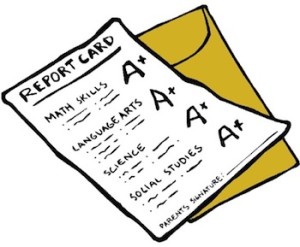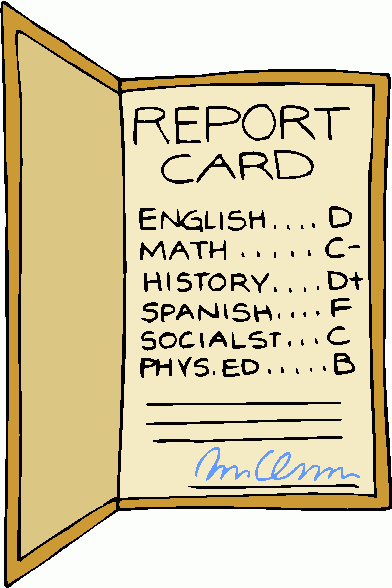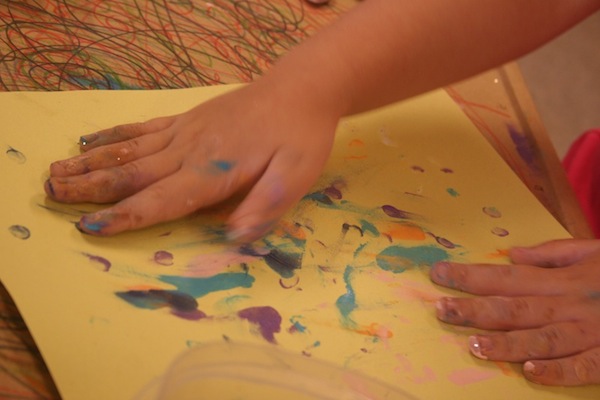It’s that time of year. If you have a school-aged child, either the first-term report card has already come home or it will be coming home soon. I’ve got news for you: regardless of what the GPA is, how you handle the report card is critical!
Report cards, like so many other things in our society, are tools for measurement. They are a small part of the whole. Body weight, BMI, credit score, thesis grade, tax bracket — we are constantly being evaluated by someone else’s rubric and standard of measurement. These things are merely a snapshot of the big picture, yet we place monumental value on those letters and numbers. How many people do you know who define themselves as worthy or unworthy based on the number on the scale? The dollar amount in the paycheck? The grade on the term paper? Instead of viewing these biomarkers for what they are – a micro within the macro – we tend to allow our grades, scores, and other alpha-numerical values to DEFINE us. When we do that with our children’s report cards, we are allowing those markers to define our children as well.
When I was younger, I was either praised for my report card, or punished for it. There was no in between and I spent considerable time in my formative years with my cherished privileges revoked. My parents, like most parents, expected that I would get amazing grades across the board because I was “intelligent” and “gifted.” WITHOUT FAIL. A’s were expected, B’s were tolerated, and anything less was a punishable offense. In fairness, my parents thought they were encouraging me to live up to my potential, when in reality, I often performed the way I performed because I was scared shit of getting punished. I did enough to get by. I did enough so I would still be able to talk on the phone. But, what was missing was that deep seated LOVE of learning and that HUNGER to absorb and challenge the information I was given. Many, many parents fall into this trap, but I want to help you explore different ways of responding to the grading rubric that will elevate and edify your children, as well as spawn a lifelong love of learning.
The truth of the matter is that there are very few, if any, individuals that are truly proficient in multiple areas of expertise. There are very few avid historians that are also expert auto mechanics. Not often do you see a renowned lawyer who is also a widely respected marine biologist. Yet, we expect our children to be flawless in their memorization and execution of multiple simultaneous subjects in school. If we look at our education system today as the antiquated funnel that it is, we will realize that our methods for TEACHING are not keeping up with the way that our children are LEARNING. We pour all kinds of math, science, languages, arts, music, spelling, geography, and the readin’, writin’, ‘rithmatic that we’ve all known and loved for centuries into the funnel and we expect our children to MASTER everything in that bowl. We want them to be proficient linguists, writers, mathematicians, anthropologists, scientists, geographers, and biologists. We then expect them to go off to college (on full academic scholarship, of course) and whittle down that entire funnel to one or two areas of profound interest so they can pick a major. By the time they emerge with their shiny new diploma, they should wield a highly refined and very specific career path that will keep them gainfully employed and passionately engaged until retirement. Why do we expect people to open wide for the thirteen year information dump, and then hope they’ll miraculously hone in on their passions and God-given talents during four years of college? Quite frankly, that’s bullshit and we’ve got it all backwards.
Here’s a crazy Ed reform idea: let’s teach kids to learn, at an early age, how to tap into their true unbridled passions and do what makes them soar while simultaneously helping them to have a base understanding of core subject matter!!
I think back to my pre-matriculation days. By all accounts, I got a phenomenal education — but I wish that someone in the educational system had taken an interest in my interests. Had that happened, I would have been better than average. Why did I love Greek mythology and Egyptian history but detest U.S. History? What were the things that enhanced my desire to learn? What was I really passionate about? What came easy to me? What kinds of teachers did I best respond to (hint: not the stodgy old white men who reeked of moth balls)? How could I best use my gifts to enhance my education?
The one area of the report card that I am personally most interested in is the character education section. My children know that we view their emotional intelligence as the North Star. They might have a hard time grasping foreign dialects or figuring out algebraic equations, but they are expected to be 100% responsible for their actions at all times. We also encourage them to be very conscious of their self-talk. Telling yourself (and others) you are terrible in math is a lot different than saying that you don’t get excited about math. The latter leaves room for improvement, the former becomes a self-fulfilling prophecy. I think of my niece, who was told by her art teacher that she was not good in art. Guess what? She believed it and subsequently never even tried to get better — art became something to be afraid of. That teacher robbed this beautiful young girl of her inherent creativity and planted a seed of self-doubt. News flash: this happens more often than we care to admit.
In the spirit of fostering excellence (not perfection) and excitement about education, let’s march on, shall we?
 Let’s say the report card comes home and you are happy with the results. The grades look good and you feel pride. Here is what I recommend:
Let’s say the report card comes home and you are happy with the results. The grades look good and you feel pride. Here is what I recommend:
- As I discussed in a recent blog post, under NO circumstances do you utter a simple “Good job!” Dig deeper. Clarify. Praise with specificity. What exactly are you happy about? Their effort? Their unwavering commitment to betterment?
- Ask questions.
- What is it about geography that gets you so excited?
- You seem to really love math. Want to put those skills to good use and help me bake some cookies?
- Why do you think science comes so easily to you? Would you like our help in taking it to the next level?
- Manage expectations. This is where, despite being satisfied, you can help turn a B+ into an A-. Lovingly. Encouragingly.
- Find ways to creatively incorporate their favorite subjects into your everyday lives. Budding scientist? Let her help in the garden, gaze at the stars, or be the family meteorologist. Geography whiz? Get him a pen pal in a different part of the world or let him help plan the next family vacation. Foster that love of learning.
- Fight back against complacency. Sometimes, after a success, there is a backslide. You get less diligent about regular check-ins and kids get lazy. Don’t let up. Stay involved. Encourage.
- Offer an appropriate reward. I wholeheartedly believe in positive reinforcement. Take your child out for an ice cream. Let them download some songs or games from iTunes. Let them invite some friends over for a sleepover. In praising with your actions, as well as your words, you can expect positive results in the future.
 More importantly, let’s say your child brings home an unsatisfactory report card and you are disappointed, or even angry. Here are some helpful suggestions for how to navigate those discussions in a way that boosts self-esteem and encourages improvement:
More importantly, let’s say your child brings home an unsatisfactory report card and you are disappointed, or even angry. Here are some helpful suggestions for how to navigate those discussions in a way that boosts self-esteem and encourages improvement:
- Be objective and be a good example. Do not use shaming words like “stupid” or “dumb.” Do not tell them they are terrible. Do not compare your child to her friends or siblings, saying things like “Why can’t you be more like your sister?” The reason she can’t be more like her sister is, quite simply, because she is NOT her sister.
- Resist the urge to yell, belittle, or punish. Ask qualifying questions, then LISTEN (without interrupting, if possible). Give your child an opportunity to explain why he feels he is falling behind. Are there social challenges at school? Is there a comprehension issue? Does she need stronger organizational skills? Is she not excited about what is being taught? Hear your child out, follow up with her teacher, and then come up with some strategies for how to make lasting improvements.
- Keep it all in perspective. Remember, a report card does not define your child! I know we all want our children to excel, get full scholarships to prestigious universities, and be financially and emotionally fulfilled. Colleges don’t look at 3rd grade report cards, however, so go easy on your child. The long term goal is to foster an eager, adaptable learner; a goal that will never be accomplished if you shame her to death.
- Stay involved. Consistently. Be an advocate and an unwavering champion. Is there a comfortable environment at home for studying and learning? Are you keeping your child on a schedule? Are they getting enough sleep and adequate nutrition? Are they free from social media and cell phone distractions during study time?
- Entertain the possibility that your child might never be a Spelling Bee champion or find a cure for cancer. Keep the focus on what she does well. If she is kicking ass in English, Math, and Biology but gets a lackluster grade in Chorus — focus on all those positive results and discuss ways she can make modest improvements in Chorus. Often, small shifts in behaviors reap big results.
- This is the time to nurture their gifts. How can organizational skills help when studying for chemistry? How can a passion for writing be utilized in history?
My best advice: don’t be the biggest bully in the room. Breaking someone’s spirit because they’ve not lived up to expectations does not allow for moments of connection and growth. And, it definitely doesn’t encourage that person to take risks, be bold, or enjoy the process. As always, the best way to encourage your child to think out of the box is to not put him in a box in the first place.
Here’s to the next generation of awesome!
XOXO
Jenn
P.S. **Don’t just read this post…engage with it. Comment on it (below). Share it on social media (via buttons above). Agree with it. Disagree with it. Share some of your tips, tricks, and successes. I love hearing from you…this is always a two way street.


